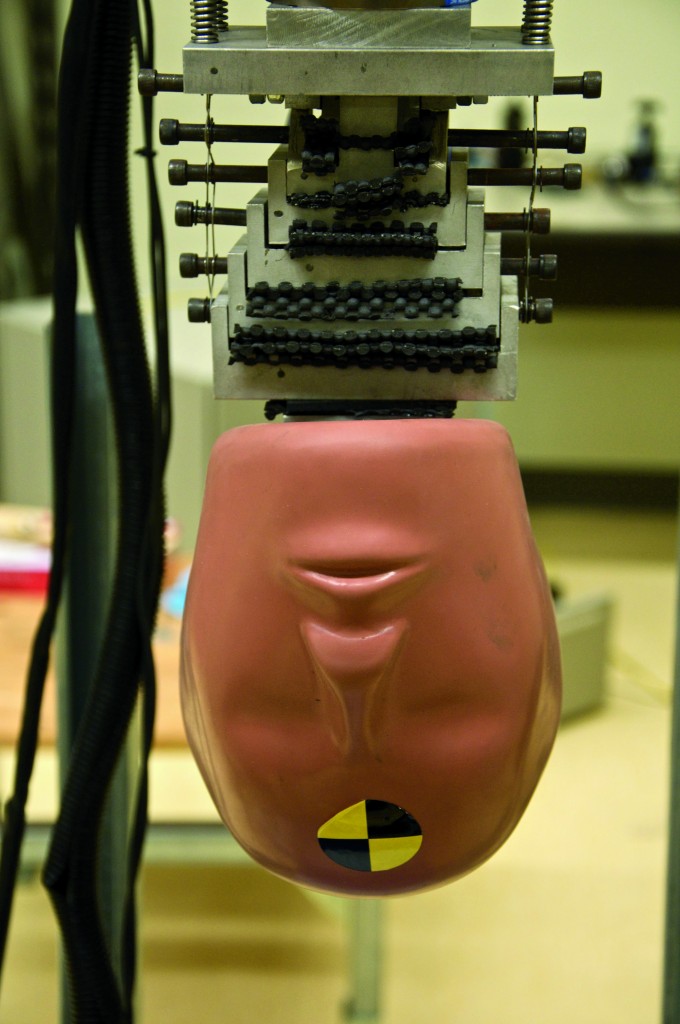
Principal Investigator
B.Sc. (Dalhousie University), B.Eng. (Technical University of Nova Scotia), M.Sc. (Queen’s University), Ph.D. (Queen’s University), Post-Doctoral Fellowship (Yale University)
Co-Director, UBC Orthopaedic and Injury Biomechanics Group
Professor and Associate Head – External, Department of Mechanical Engineering
Associate Faculty Member, Department of Orthopaedics, Faculty of Medicine, University of British Columbia
Research Interests
brain injuries; concussion; Cycling injuries; Helmet performance; hip fracture; Hip injury; injury biomechanics; Injury prevention; Medical evaluation; Orthopaedic biomechanics; Sex differences in automotive crashes; spinal cord injury; Spine injury; spine traumaDr. Cripton’s research interests are primarily focused on prevention, rather than treatment: an injury that never happens, as he points out, needs no repair or therapy. To this end, he works on spine, hip, and concussion biomechanics, all focused on either preventing injury or minimizing it as it happens. He also works a great deal with geriatric and pediatric models, looking at ways of preventing injury to very old and very young people. He and his team are developing improved mechanical and computational models of spines for crash test dummies and other injury testing, and they use pressure sensors to study swelling of the spinal cord after injury to better understand the response of the spinal cord to injury . He is also working with the US Department of Defense on setting safe transfer limits for medical evacuations.
Dr. Cripton is Co-Director of the UBC Orthopaedic and Injury Biomechanics Group. He is a Professor and the Associate Head – External in the Department of Mechanical Engineering, an Associate Faculty Member in the Department of Orthopaedics at the University of British Columbia, and a Principal Investigator at ICORD. Dr. Cripton’s undergraduate degrees in mathematics and mechanical engineering at Dalhousie University and the Technical University of Nova Scotia were followed by an M.Sc. and a Ph.D. at Queen’s University, his Ph.D. was collaborative with the University of Bern in Switzerland where he conducted experiments for his doctoral research. Dr. Cripton also worked as a Post–Doctoral Fellow at Yale University and he spent three years working as a consulting engineer at Exponent Inc. in Philadelphia before moving to UBC.
As the prevention of spinal cord injury is Dr. Cripton’s primary focus, he is very happy to be working in one of the few centres of SCI research with a focus on prevention. Working at the Blusson Spinal Cord Centre, just like being part of ICORD, gives him access to neuroscientists, clinicians, and basic scientists, all of whom are open to collaboration. The reason for the centre is the proximity it brings and similarly is one of the real strengths of ICORD as a group.
Recent Collaborations:
Dr. Cripton works with Dr. Brian Kwon on safe vibration levels for medical evacuations and on studying swelling mechanics of the spinal cord after injury and on developing appropriate devices to simulate human-like SCI.
Together with Dr. John Street, he is working on the development of a helmet to prevent SCI in impacts (the Pro-Neck-Tor™ helmet).
He collaborates with Dr. Christian Puttlitz of Colorado State University on advanced material models for the spinal cord.
He works with Dr. Cheryl Wellington investigating the link between concussions and early onset degenerative brain diseases like dementia
Major Findings:
Dr. Cripton’s work with head-first impact studies the spinal cord deformations resulting from such an impact. He studies cervical spine and spinal cord injury in models, which increases understanding of these injuries and allows greater prevention. His drive for prevention led him to his work on developing the Pro-Neck-Tor helmet as part of an international research collaboration. Dr. Cripton’s team designed and established a helmet-mounted device to prevent spine and cervical spine injuries. Read more about the Pro-Neck-Tor helmet in this article.
Dr. Cripton also tests spinal implants, detailing the biomechanics of disc replacements. He also works on pre-clinical testing of new spine implants and develops spine implants for people with degenerative changes or deformations of the spine. His goal is to improve motion and reduce pain.
His work with cerebral spinal fluid pressure measures the pressure of the fluid during injury and monitors the development of pressure after injury. This work allows surgeons to understand the difficulties in acute injury, to reduce the build-up of fluid, and to protect the spinal cord.
Techniques employed in the lab:
- Experimental impact testing
- Drop towers and drop rails for helmet testing & neck testing
- Head-first simulation drop tower
- High speed vibration and high-speed bi-planar x-ray
- Materials testing machine and spine motion simulator
Affiliation with organizations and societies:
- American Society of Testing Materials (ASTM)
- Brain Research Centre (BRC), University of British Columbia
- The Centre for Hip Health and Mobility
- Orthopaedic Research Society (ORS)
- Swiss Federal Institute of Technology (ETH Zurich)
Awards
Some of Dr. Cripton’s major awards and accomplishments include:
- Member of the International Research Council on the Biomechanics of Impacts, January 2020
- Killam Teaching Prize (UBC, 2011-2012)
- Outstanding Paper Award in Sensors and Sensing Systems for ‘A minimally invasive in-fiber Bragg grating sensor for intervertebral disc pressure measurements’, published in Measurement Science and Technology, Volume 19, Issue 8. 2008. (With 3 others)
- University of British Columbia, Killam Faculty Research Fellowship 2009-2010
- NDI Young Investigator award for: Newell R (presenter), Siegmund G, Blouin JS, Street J, Cripton PA, Preparing for headfirst impact affects the muscle activity and posture of the neck,Conference for the Canadian Society of Biomechanics, June 6-9, 2012, Burnaby, Canada.
Current Lab Members
| Masters Students | Ph.D. Students | Postdoctoral Fellows | Research Staff |
|---|---|---|---|
| Jade Levine | Emily Bliven | Paris Vakiel | Vivian Chung |
| Luis Dias | Loay Al-Salehi | Pawel Kudzia | Luis Dias |
| Cristina Berci | Amir Borjali | Zhenhao Yang | Alex Burden |
| J.C. Rong | |||
| Danielle Rowlands |
Trainee Awards
| Year | Name | Award |
| 2023 | Luis Dias | 1st place poster award, ICORD |
| 2014 | Jackie Soicher | Top Master’s Presentation at the Northwest Biomechanics Symposium |
| Carolyn van Toen | Hines Award for Best Oral Presentation at the Ohio Injury Biomechanics Symposium | |
| 2013 | Seth Gilchrist |
|
| 2011 | Christopher R. Dennison | Postdoctoral Fellowship (Natural Sciences and Engineering Research Council of Canada) |
| 2010 | Claire Jones | Margaret H. Hines Award for Best Oral Presentation at the Ohio Injury Biomechanics Symposium |
| 2009 | Hannah Gustafson | US National Science Foundation Fellowship |
| 2008 | Carolyn van Toen | Post-Graduate Scholarship (Natural Sciences and Engineering Research Council of Canada) |
| Seth Gilchrist | Bridge Program Fellowship; University Graduate Fellowship | |
| Robyn Newell | Mathematics of Information Technology & Complex Systems Scholarship |
Current Opportunities in the Lab
There are currently no openings in Dr. Cripton’s lab. Please contact Dr. Cripton with inquiries.
Videos
Dr. Peter Cripton gives a quick demonstration and explanation of his Pro-Neck-Tor helmet.
Dr. Peter Cripton tests a bicycle helmet for Global News.
Recent publications
- Al-Salehi, L, Siegmund, GP, Partovi, R, Cripton, PA. 2026. In Vivo Cervical Spine Posture Changes During Non-impact Inverted Freefalls.. Ann Biomed Eng. doi: 10.1007/s10439-025-03917-6.
- Thompson-Bagshaw, DW, Quarrington, RD, Cripton, PA, Jones, CF. 2026. Cervical spine posture, but not head-end motion constraints, governs the kinematic and kinetic response in sub-injurious axial impacts.. J Mech Behav Biomed Mater. doi: 10.1016/j.jmbbm.2025.107321.
- Soltan, N, Svensson, MY, Jones, CF, Cripton, PA, Siegmund, GP. 2025. Correlating head kinematics and cervical cerebrospinal fluid pressure transients in simulated whiplash exposures.. J Biomech. doi: 10.1016/j.jbiomech.2025.112994.
- Slater, TD et al.. 2025. A Comparison of Five Animal Models for Acute Intervertebral Disc Herniation Research.. JOR Spine. doi: 10.1002/jsp2.70116.
- Koppel, S et al.. 2025. Assessing seatbelt use among pregnant drivers in Australia: Correct seatbelt positioning, discomfort, knowledge and information sources.. J Safety Res. doi: 10.1016/j.jsr.2025.02.015.


